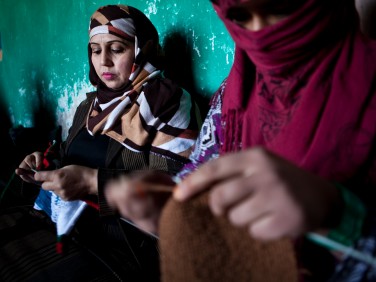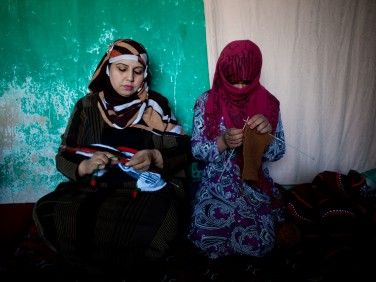
Meet Palwasha, the trainer who returned home
Hand in Hand Afghanistan entrepreneurs aren’t the only ones making a difference. Across the country, in a growing number of provinces, trainers are too.
Take Palwasha Rafiqzada (pictured above, left). In less than a year, the vocational trainer has instructed 154 women in five different villages on skills as varied as poultry rearing and knitting. It’s a small contribution to the thousands of jobs created by Hand in Hand Afghanistan, but one that Palwasha finds hugely fulfilling all the same. “I’m proud to work with poor people toward a change,” says the 41-year-old.
An uphill battle
 She isn’t exaggerating. After 35-plus years of near-continuous conflict, Afghanistan is the tenth poorest country in the world, with a child mortality rate of 99/1,000, the highest outside sub-Saharan Africa, and a maternal mortality rate of 460/100,000, the second-highest outside sub-Saharan Africa.
She isn’t exaggerating. After 35-plus years of near-continuous conflict, Afghanistan is the tenth poorest country in the world, with a child mortality rate of 99/1,000, the highest outside sub-Saharan Africa, and a maternal mortality rate of 460/100,000, the second-highest outside sub-Saharan Africa.
Like so many others at Hand in Hand Afghanistan – from fellow vocational trainers to CEO Abdul Rahim Nasry – Palwasha knows our members’ struggle first-hand. In the late-1990s, as conflict spread into north Afghanistan, the mother of six was forced to abandon a career in education and seek refuge in Pakistan. It was there, in a crowded immigration camp, that the graduate of Sayed Jamaluddin Afghan University learned how to sew, knit and rear poultry – skills she still teaches today.
“I’m proud to work with poor people toward a change”
Motivation
Hand in Hand hires local field staff exclusively. Beyond suiting our ethos of self-reliance – and helping keep expenditures low – the practice means trainers are invested in their work.

Palwasha returned to Balkh Province after the Taliban fell in 2001. Her husband found work as a doctor’s assistant. She found work with several NGOs, including a stint as poultry team supervisor at the UN’s Food and Agriculture Organization, before joining Hand in Hand more than a decade later in May 2013.
It’s work she has every intention of continuing. “The people I work with face many problems – poverty, a lack of education, inadequate life skills – but by the time they graduate I find them strong and enabled,” says Palwasha. “When they start to earn money they improve their position in the family and in society.”
Balkh Province, Afghanistan
Editor’s note: Palwasha no longer works for Hand in Hand.
Next case study: Chanar Gul: from subsistence to success
